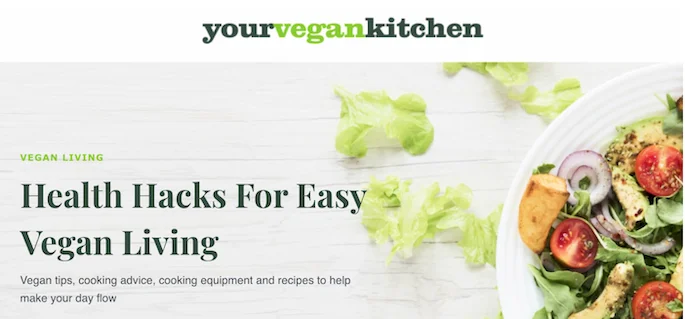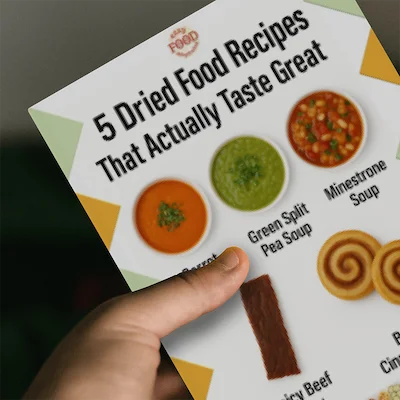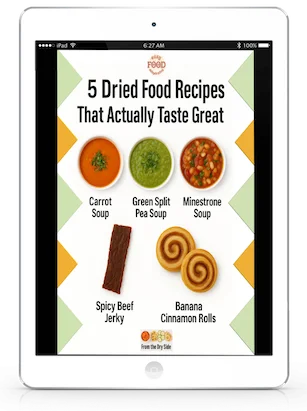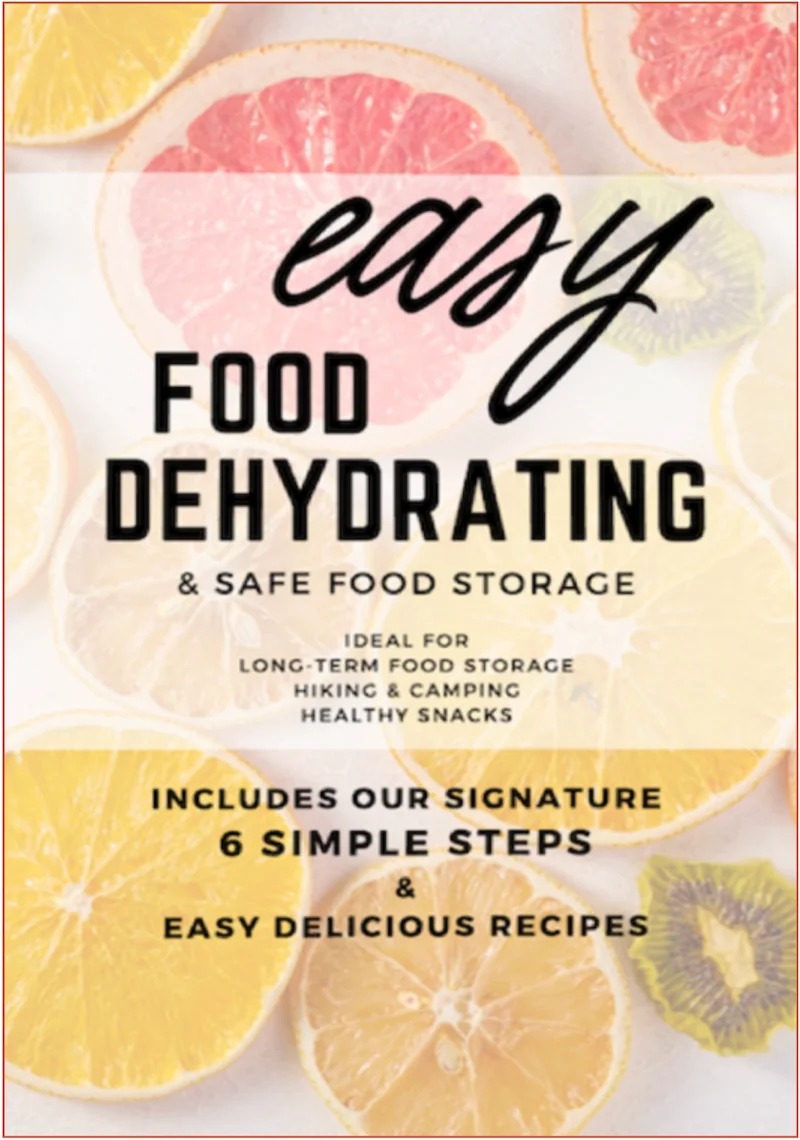What We Mean by “Dehydrate”
Here at Easy Food Dehydrating, “dehydrate” always means using an electric food dehydrator — the easy, reliable way to dry food at home.
- Home
- Articles On How To Dehydrate Food Safely
- Food Dehydrating for Fun and Profit
Turn Your Dehydrating Hobby
Into a Profitable Side Hustle
Guest Post by Gregg Owens
Ever wondered if you could use your dehydrator for fun AND profit? You know, make more than just make snacks for your pantry?
✅ Quick Answer: Can you really make money from food dehydrating?
Yes, many hobbyists turn food dehydrating into a profitable side hustle by selling dried snacks at farmers’ markets or online. With low startup costs, a good dehydrator, and in-demand products like fruit leather or veggie chips, it’s a fun and practical way to earn extra income from home.
Many home-based hobbyists are turning their love of food dehydration into a profitable side hustle—some even replacing their 9-to-5 income.
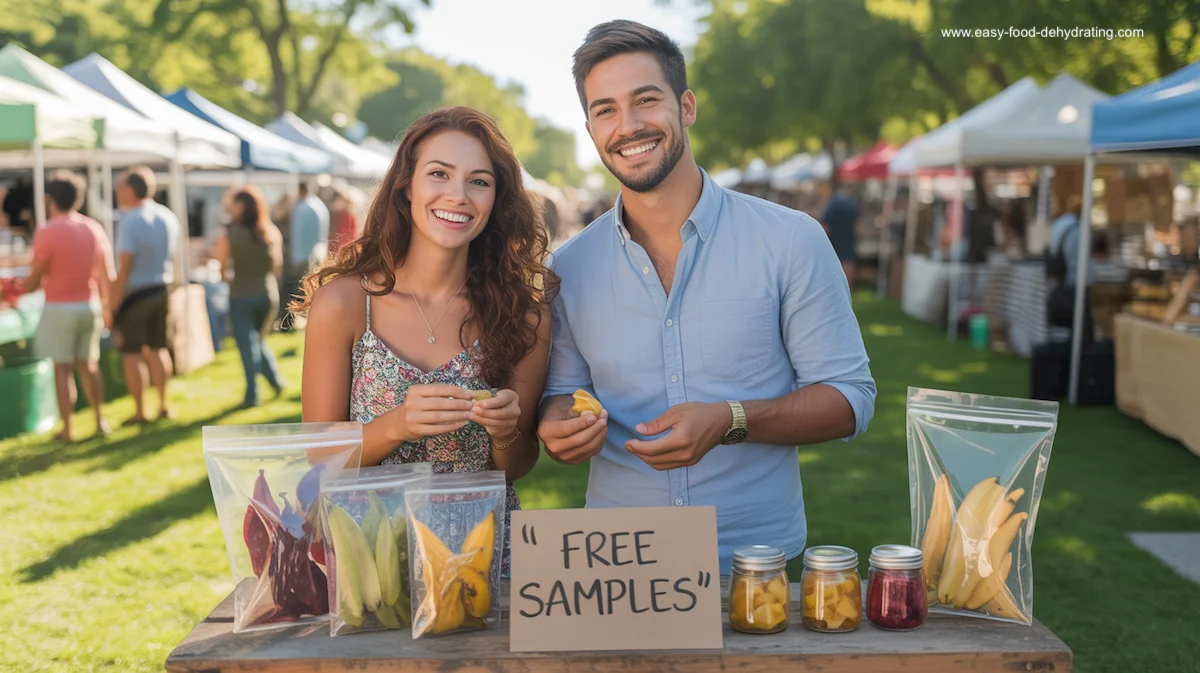
In this post, you'll learn how one couple turned dried mango strips into a steady stream of cash, and how you can do the same with just a bit of know-how and a few smart moves.
Have you ever considered using your domestic food dehydrator to produce a side income for you and your family?
On a recent trip to Australia, I met a family who is doing just that. After years of their friends and relatives telling Julie and Rob that they had the “best fruit leather ever” they produced a small batch and went to try it out on the public at a local Farmer's Market.
That first market was so successful for them that they sold out within 2 hours (the market was meant to go for 6 hours). The next weekend they doubled their batch but sold out again in just 2 hours, and the word of their delicious treats was spreading.
How One Couple Turned Dehydrating Into a Side Hustle
I met them six months into their ‘side business journey’, and they had since expanded their operation so that they no longer run out.
They are having so much success that their weekend farmers' market income is fast matching their employment earnings (Julie works in Administration and Rob is a high school teacher).
It has been an incredible journey for their family, and I was lucky enough to have a chat with them and they gave me their best tips for success for others who would like to also turn their hobby into a paid income.
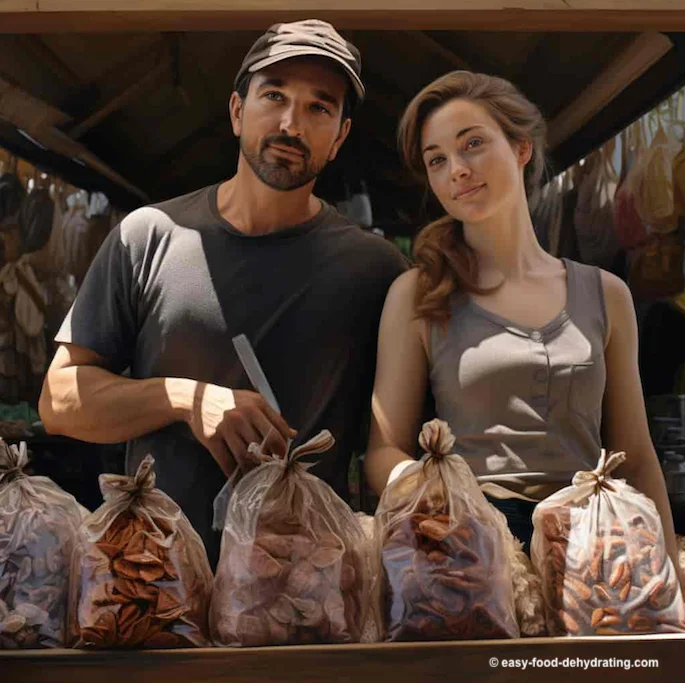
Top 5 Tips for Making Money with Food Dehydrating
1) Match Supply with What People Want
Before you produce a single treat, ask a few friends and people in the community what they would like to buy. Julie and Rob were lucky; their first run was Banana Chips, Dried Apricots, and Dried Mango Strips. They thought the initial sell-out was a fluke.
In the subsequent weeks, they ‘experimented’ with Dried Spices that just did not sell. They assumed others would want to buy these, but the demand was not there.
The lesson: Make sure there is a high demand for your product before you choose to produce on scale in order for food dehydrating for fun and profit to be—well—profitable!
2) Offer Free Samples to Boost Sales
For Julie and Rob, they credit a big part of their success to giving out free samples so that people can try them first. They estimate that about 40% of people buy product straight away, and another 20% in the next weeks after these 'testers'.
This is an incredible return on investment!
The lesson: Not everyone is going to be familiar with food that has been dehydrated, so this is an amazing way of turning them into paying customers.
3) Expand Your Product Line Once You're Profitable
Julie and Rob quickly realized that people liked their treats because it is a healthy alternative for snacks. They reached out to local businesses and offices where people worked and offered their snacks as a subscription service for their workers.
Now, they have a reliable income per month they can use to grow their business.
4) Start Simple — Don’t Over-complicate It
Don’t Invest in Things that Don’t Matter. So many people make the mistake of spending money on things that don’t matter at the start. You don’t need business cards, flashy packaging, or a big banner with your name on it.
If your product is good, it will sell itself—those things can come later.
5) Take the Leap and Test the Waters
You won’t know if you don’t try. Rob and Julie told me that since they didn’t have thousands of dollars on the line, they could easily commit to giving it a go. You should too.
The worst that could happen is you don’t sell your produce (you can eat it over the coming months), OR the other alternative is you suddenly have an alternate income stream that can put you ahead in life.
FAQs About Selling Dehydrated Food for Profit
Can I sell dehydrated food from home legally?
Can I sell dehydrated food from home legally?
It depends on your local laws, but in many U.S. states, you can sell certain dehydrated foods from home under cottage food laws.
These laws allow small-scale food businesses to operate without a commercial kitchen—often with limits on sales volume or where you can sell (e.g., only direct-to-consumer or at farmers' markets). Check with your local Department of Agriculture or Health Department.
Do I need a license to sell dehydrated snacks?
Do I need a license to sell dehydrated snacks?
In most states, yes—some type of permit or food handler’s certification is usually required, even under cottage laws.
If you plan to sell online or ship across state lines, federal regulations may apply too. The safest move is to contact your county extension office or small business development center. They’ll know your state’s specific requirements.
What foods sell best when dehydrated?
What foods sell best when dehydrated?
Top sellers include:
- Fruit leathers (mango, strawberry, apple-cinnamon)
- Banana chips
- Dried veggie crisps (like zucchini or beet chips)
- Jerky (beef or chicken—but this requires more safety regulations and likely isn’t allowed under cottage laws)
- Herb blends and spice mixes
Start with shelf-stable, non-potentially hazardous foods. Avoid anything that could grow bacteria easily (like dairy or meat) unless you have commercial approval.
How much can I earn selling dehydrated foods?
How much can I earn selling dehydrated foods?
Earnings vary, but many hobbyists report making $200–$1,000/month by selling at local markets, craft fairs, or through subscriptions. If demand is high and you scale production wisely, it’s possible to earn part-time or even full-time income.
Like Julie and Rob, consistent quality, smart pricing, and listening to your customers are key to long-term success.
When food dehydrating for fun and profit, you need a good dehydrator. A basic dehydrator like the Nesco FD-75A is perfect for beginners.
If you need some tips or advice on which dehydrator is the best on the market today, read my post about the 5 Best Dehydrators for Drying Herbs here.
If you would like to eat a more healthy diet full of plant-based alternatives, check out this website called Your Vegan Kitchen here.
this post brought to you by:
Thanks, Gregg, for such an informative post!
The "giving out of samples" is a very good idea, and it works. How many times have you been in the grocery store and they offer bites of food? You take the bait, and you buy a box of it.
Or how about when the shopping malls and restaurants hand out samples? (Bourbon Chicken comes to mind in our local mall!) again - mission accomplished and the Bourbon Chicken devoured.
Also, having fewer products at the start of a new venture to choose from is a sane idea. Why? Very often, when we have too much to choose from, we get analysis paralysis and end up choosing nothing. That's not the desired outcome, right?
Also if you've ever watched Shark Tank, you know the sharks cringe when a young company/startup has 1001 SKUs. That's too much inventory to have on hand when you're first starting out.
It also reminds me of Restaurant Impossible when Chef Robert Irvine has to tackle a problem menu that's six pages long... again, too much inventory to maintain.
KEEP IT SIMPLE.
This from directly pulled from Google:
"The main difference between SKUs and UPCs is that SKUs (stock-keeping units) are for internal use and UPCs (universal product codes) are for external use.
Both are great tools for tracking and managing inventory, monitoring supply
chains, and analyzing the sales trends. However, SKUs and UPCs can have
different characteristics."
So, whether you're just starting out or looking to take your dried food hobby to the next level, remember that simplicity, smart sampling, and matching your market are key.
And to help you get inspired in the kitchen, be sure to grab your free 5 Dried Food Recipes You'll Actually Love PDF (below). They’re delicious, easy to make, and perfect for testing out your own sellable snack ideas!
Get 5 Dried Food Recipes You'll Actually Love
Here's where you can get your copy of our all new
5 Dried Food Recipes (That Actually Taste Great)
They're my all-time favorite easy dried food meals!
Get it here right now.
For Free!
Before You Go...
If you enjoyed this page, tap the ❤️ in the lower right-hand corner.
It saves this page to your Grow bookmarks so you can find it again later.
You’ll also see quick share buttons to copy the link, post to Facebook,
or save it straight to Pinterest.
